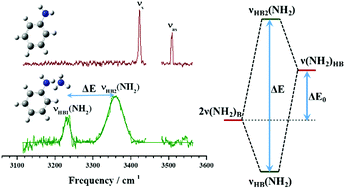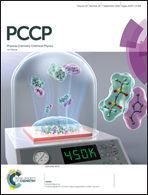Hydrogen bond induced enhancement of Fermi resonances in N–H⋯N hydrogen bonded complexes of anilines†
Abstract
The hydrogen-bonded complexes of aniline, 4-fluoroaniline and 4-ethynylaniline with ammonia, methylamine, dimethylamine, trimethylamine and triethylamine, were investigated using IR-UV double resonance spectroscopy. The formation of N–H⋯N hydrogen bonded complexes with anilines as donors and alkylamines as acceptors was inferred from the appearance of the spectra. Two bands appearing in the 3100–3400 cm−1 region were found to be originating from the Fermi resonance coupling between the hydrogen-bonded NH2 stretching and NH2 bend-overtone vibrations. A two-state de-perturbation analysis yields the zero-order (unperturbed) vibrational states and the coupling constant. An inverse correlation between the zero-order hydrogen-bonded NH2 stretching and NH2 bend-overtone was observed due to a switch in the relative contributions of hydrogen-bonded NH2 stretching and NH2 bend-overtone vibrations to the Fermi resonance bands. These results lead to the reassignment of the hydrogen-bonded N–H stretching frequencies of aniline complexes reported earlier. Furthermore, the stretch-bend Fermi-resonance coupling constant for the NH2 group is around 50 cm−1, which is independent of the nature of the parent donor molecule and the acceptor, and is intrinsic to the NH2 group.

- This article is part of the themed collections: New Frontiers in Indian Research and New Frontiers in Indian Research


 Please wait while we load your content...
Please wait while we load your content...